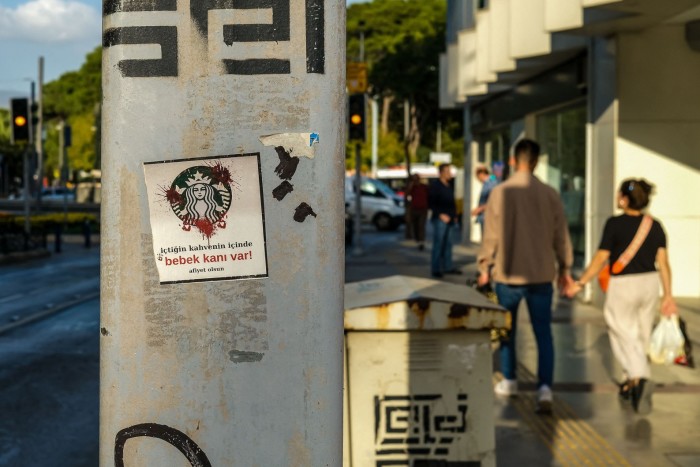“Pour over the cold milk, followed by the vanilla syrup, ice and two shots of coffee,” explains food blogger Walla Abu-Eid in a viral recipe video seen by nearly 130,000 people on her TikTok channel.
“Let’s continue the boycott,” concludes the Sydney blogger, asking “what Starbucks drink should I make next?”
Suggestions for homemade alternatives to Starbucks have proliferated on social media after the world’s largest coffee chain has been hit by global protests and grassroots boycott campaigns since the start of Israel’s military offensive in Gaza. McDonald’s has also been hit, warning this week that its most recent quarterly sales have been hurt by war-related boycotts.
Activists have issued calls to avoid Starbucks products after the company sued the workers’ union over a social media post last October. The chain claimed that Workers United infringed on its trademark by using the company’s name and logo to express solidarity with Palestinians in a post on X, formerly known as Twitter. Workers United responded with its own court filing, claiming that Starbucks defamed it by implying that the union supports terrorism and violence.
The disagreement has left Starbucks in the crosshairs of both pro-Palestinian and pro-Israeli protests. In an open letter published late last year, company CEO Laxman Narasimhan said Starbucks stores “have experienced incidents of vandalism” in cities around the world, including the United States.
In a separate statement, the company said it had “no political agenda” and rejected rumors on social media that it would use its profits to fund “any government or military operation anywhere.”

Amid low US consumer confidence and weakening sales growth, analysts question whether the boycotts have the power to inflict real financial pain on the industry giant.
Although the specific impact of boycotts is “very difficult to verify or quantify. . . it’s definitely something investors are thinking about these days,” said Danilo Gargiulo, senior research analyst at AB Bernstein.
Starbucks missed analysts’ expectations when it announced first-quarter results last week. Global same-store sales rose 5% year over year in the three months through January, below consensus forecasts of a 6.4% increase. The company also revised down its forecast, saying it now expects full-year global same-store sales to rise between 4% and 6% in 2024, down from earlier estimates of growth from 5 % to 7%.
“We have seen a negative impact on our business in the Middle East,” Narasimhan said on an earnings call. The chain’s sales in the United States have also slowed since mid-November, driven in part by “misperceptions” about its position in the conflict, he added. Same-store sales in North America grew 5% in the first quarter of 2024, missing the consensus 5.5% growth forecast.

In the week of “Red Cup Day” – an annual mid-November winter holiday promotion in which Starbucks gives visitors a free reusable cup – the chain saw a 31.7% increase in the number of U.S. visitors compared to to the daily average over the previous five weeks. , well below the 81% increase seen in 2022, according to third-party traffic data from Placer.ai.
Businesses around the world are struggling to adapt to political flashpoints whose fallout has the potential to alienate customers.
“Typically, [boycotts] they are quite limited in terms of geographic scope and duration,” Gargiulo said. “But I would like to make a caveat here, because today we live in a different era than even a few years ago, given the growing geopolitical tension we are witnessing around the world.”
McDonald’s has experienced this firsthand, with the burger chain reporting that same-store sales in its licensed international division – which covers more than 80 markets where McDonald’s has licensed its franchise rights – have largely disappointed analysts’ expectations in the three months to the end of December. . The company attributed the slowdown mainly to falling demand at its restaurants in the Middle East and Muslim-majority restaurants such as Indonesia and Malaysia.
The pro-Palestinian Boycott, Divestment and Sanctions (BDS) movement supported a boycott of the burger giant last year, after the McDonald’s Israel franchise said on its social media account that it had given away thousands of meals free to Israel Defense Forces personnel.
McDonald’s CEO Chris Kempczinski said in a LinkedIn post last month that “several markets in the Middle East and some outside the region are experiencing significant business impacts as a result of the war.”
“We are dismayed by misinformation and inaccurate reporting regarding our position in response to conflict in the Middle East. McDonald’s Corporation does not fund or support any government involved in this conflict,” McDonald’s said, adding that “any actions” by local licensing partners “were taken independently without the consent or approval of McDonald’s.”
Gargiulo noted: “If boycotts were a concern for the CEO of McDonald’s, investors are basically asking, why wouldn’t they be a concern for Starbucks?”
Ice cream maker Ben & Jerry’s is one of the few companies to have publicly called for a permanent ceasefire in Gaza.
It did so at the risk of reigniting a long-running dispute with its parent company Unilever, which sold the Israeli portion of the brand to a local licensee in 2022, after Ben & Jerry’s attempted to stop selling its products in occupied Palestinian territories.
But some analysts blame Starbucks’ slowing sales as symptomatic of a broader decline in sentiment among U.S. consumers, as well as a stalling economic recovery in China, the company’s second-largest market, where it has about 6,500 stores. Others noted that it coincided with the launch of a new winter menu, which could disappoint customers.
“Our ability to bind the [slowdown] to any potential boycott is very, very challenging, even if the company has acknowledged the impact,” said Matthew Goodman, senior analyst at data research firm M Science.
Starbucks is no stranger to customer ire. Over the past two decades, some have criticized her for supporting same-sex marriage, while others have disliked her stance on unionization efforts by her employees. Despite this, the company continued to grow.
“This kind of thing happens regularly and generally doesn’t have a lasting impact on companies — sentiment can change very quickly,” said Michael Barnett, a professor of management and global business with a focus on corporate social responsibility, at Rutgers Business School .
But he warned that while most boycotts have ended with customers returning to their old routines, they have the potential to bring lasting consequences if they have gone on “long enough to get people to change their patterns.” of purchase”.
“You might switch to something else that you think is a good substitute—it might be cheaper or something you like better, and you just establish a new habit.”